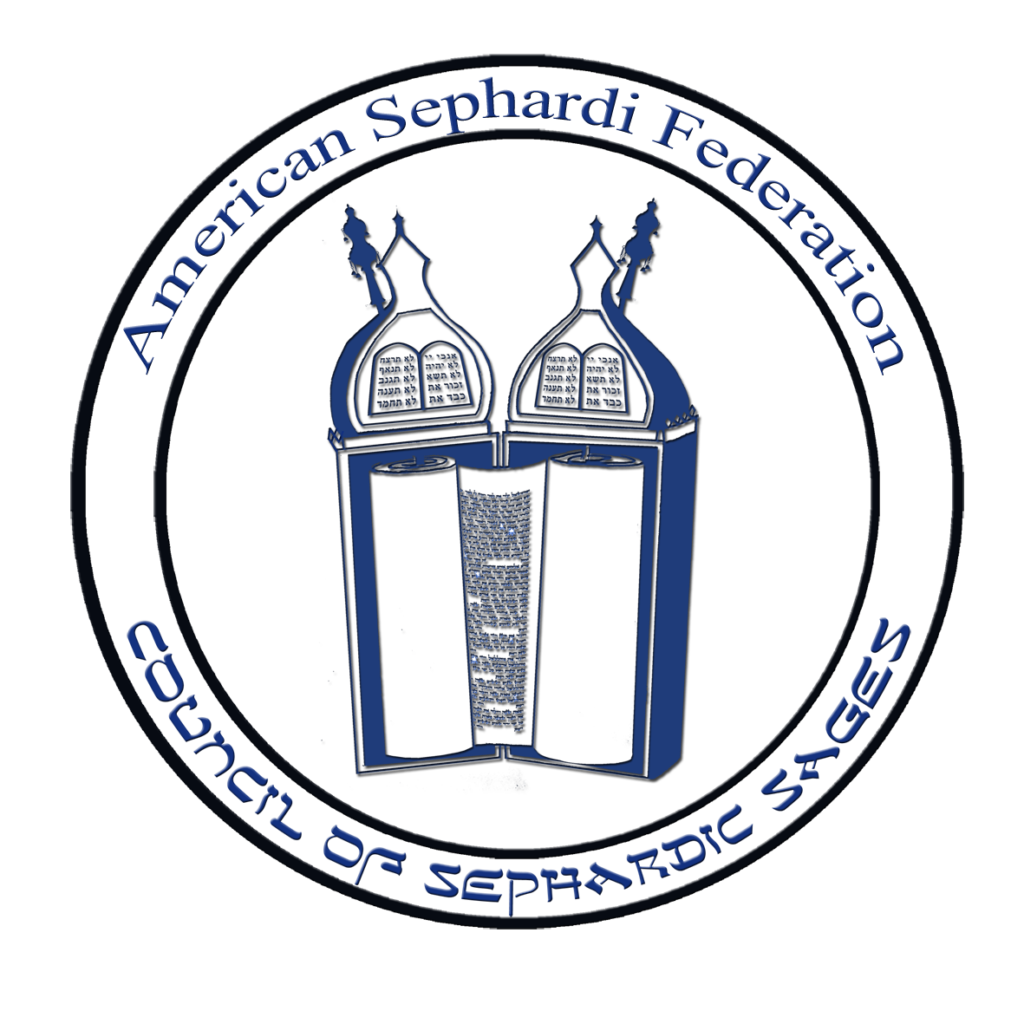The Sephardi Modus Vivendi & Jewish Unity
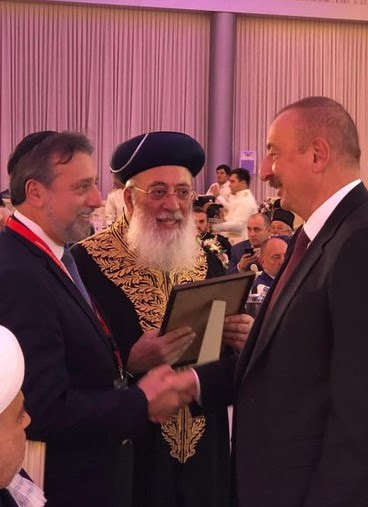
In Honor of Memorial Day, this issue of Sephardi Ideas Monthly is dedicated to the Sepharadim who have served and sacrificed in every generation on behalf of American liberty since the first stirrings of the War of Independence. From Major Benjamin Nones and Commodore Uriah P. Levy, to Colonel Jonathan de Sola Mendes, CPL Morris “Moe” Meshulam (A”H), and PFC Daniel J. Agami (A”H), the ingenuity, erudition, fortitude, and virtue under fire demonstrated by American Sephardi patriots are essential examples for Americans of all backgrounds and professions to emulate. The American Sephardi Federation proudly preserves, promotes, and presses for greater recognition of this rich yet little-know Sephardic legacy as part of the Jewish experience.
Click here to dedicate a future issue in honor or memory of a loved one.

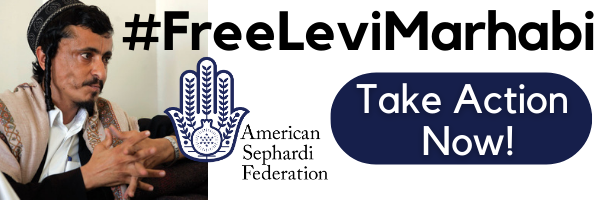
During Passover, Iranian regime-backed Houthis expelled almost all of Yemen’s last Jews. They continue to illegally imprison Levi Salem Musa Marhabi. Don’t turn away. Don’t close your eyes. Don’t let another group of Jews become forgotten refugees. Join the ASF’s campaign to #FreeLeviMarhabi!
Sephardi Ideas Monthly is a continuing series of essays and interviews from the rich, multi-dimensional world of Sephardi thought and culture that is delivered to your inbox every month.
This month’s issue features an interview with Rabbi Dr. Elie Abadie, Chair of the ASF’s newly established Council of Sephardic Sages (CSS).
Rabbi Dr. Abadie comes from a long and distinguished rabbinical lineage dating back to fifteenth century Spain and Provence. Born in Beirut, Lebanon, he grew-up in Mexico City before settling in the United States. Following in the footsteps of the greatest Jewish scholar and philosopher, Moses Maimonides (the RAMBAM), he is both a rabbi and a physician, practicing Gastroenterology.

(Photo courtesy of R’Abadie)
The Sephardi Modus Vivendi & Jewish Unity
Rabbi Dr. Abadie is fluent in English, Spanish, Hebrew, Arabic, French, as well as conversant in Italian and Portuguese. He has served on the Board of the American Sephardi Federation, as the Director of the Jacob E. Safra Institute of Sephardic Studies at Yeshiva University, and was Founder and former Head both of the Sephardic Academy of Manhattan and the Manhattan East Synagogue – Congregation Shaare Mizrah. Rabbi Dr. Abadie is a recipient of the Jerusalem Medal, Orden Del Merito Civil (the highest civil decoration by His Majesty King Juan Carlos I of Spain), and many other commendations. Together with heading the Council of Sephardic Sages, Rabbi Dr. Abadie serves as the Senior Rabbi of the Jewish Community of the Emirates and the Association of Gulf Jewish Communities.
Regarding the establishment of the ASF Council of Sephardic Sages and the appointment of R’ Dr. Abadie as its Chair, ASF President David E.R. Dangoor, together with ASF Executive Director Jason Guberman, said that the establishment of the Council is meant to “signal the return of classical Greater Sephardi values to the center of Jewish life and relations with the wider world. As a Syrian refugee exiled from Lebanon to Mexico, as an immigrant student to the US, as the founder of both NYC’s Edmond J. Safra Synagogue and Moise Safra Community Center, and now the Association of Gulf Jewish Communities, Rabbi Abadie’s experiences, education, and enlightened leadership will be of great benefit to the Jewish people.”
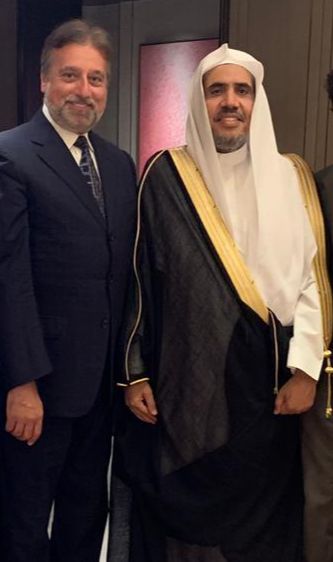
(Photo courtesy of MWL)
It should be noted that the establishment of the Council has reverberated beyond Jewish circles. For instance, Dr. Muhammad Ali Al-Husseini, the Secretary General of the Arab Islamic Council in Lebanon, sent his blessings and congratulations from Beirut:
I salute the American Sephardi Federation’s Council of Sephardic Sages for their great effort to restore and rekindle Islamic-Jewish relations. I address my special thanks and gratitude to my dear brother and the great reformer, the Senior Rabbi of the United Arab Emirates, Dr Elie Abadie, who works day and night with all his energy to revive, strengthen, and unify the Jewish people. As a Lebanese Sephardic Jew born in Beirut and most familiar with understanding Islamic culture and society, Hakham Abadie can be most effective in dialogue and communication, building bridges of convergence, and advancing the achievement of peace. I pray that peace will settle between us, so that we can live together in tolerance and love.
Sheikh ul-Islam and Grand Mufti of the Caucasus, Haji Allahshükür Hummat Pashazade, wrote to Rabbi Abadie from Baku:
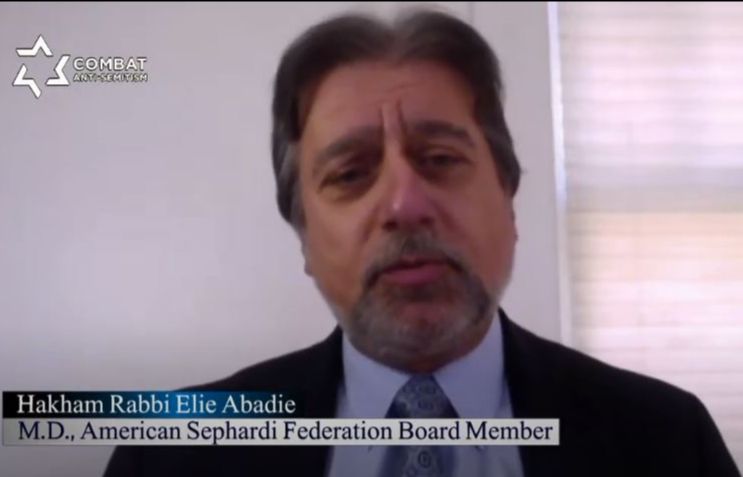
(Screenshot courtesy of CAM/ASF/Youtube)
I welcome you with the most beautiful welcome, and I pray to our one Lord to guide you with good health and comrades. I received the beautiful news of your Excellency being elected President of the Council of Sephardi Sages of the American Sephardic Federation with great pleasure. There is no doubt that in your assumption of this leadership position, in addition to your other positions, will advance cooperation and solidarity between the divine religions…. I assure you of the fact that the Baku International Center for Interfaith Cooperation and Civilization as well as the Caucasus Muslims Administration welcomes extensive cooperation with the ASF Council of Sephardic Sages. I pray to God Almighty to comfort you and your decent family, and give you more health and success.
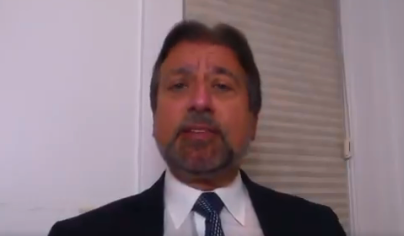
(Screenshot courtesy of ASF/Twitter)
Rabbi Dr. Abadie graciously took time off from his many responsibilities to answer our questions.
Sephardi Ideas Monthly (SIM): What need is the Council of Sephardi Sages (CSS) designed to fill?
R’ Dr. Abadie: The mission of the ASF’s Council of Sephardic Sages is to revive the Sephardic Tradition of living, adjudicating, and solving issues in all sphere of life, including, but not limited to: religious ritual, educational philosophy, cultural etiquette, social discourse, diplomatic activity, and more. The CSS will provide Jewish education, policy proposals, and opinions based on the religious, historical, and cultural legacy of Sephardic Sages.
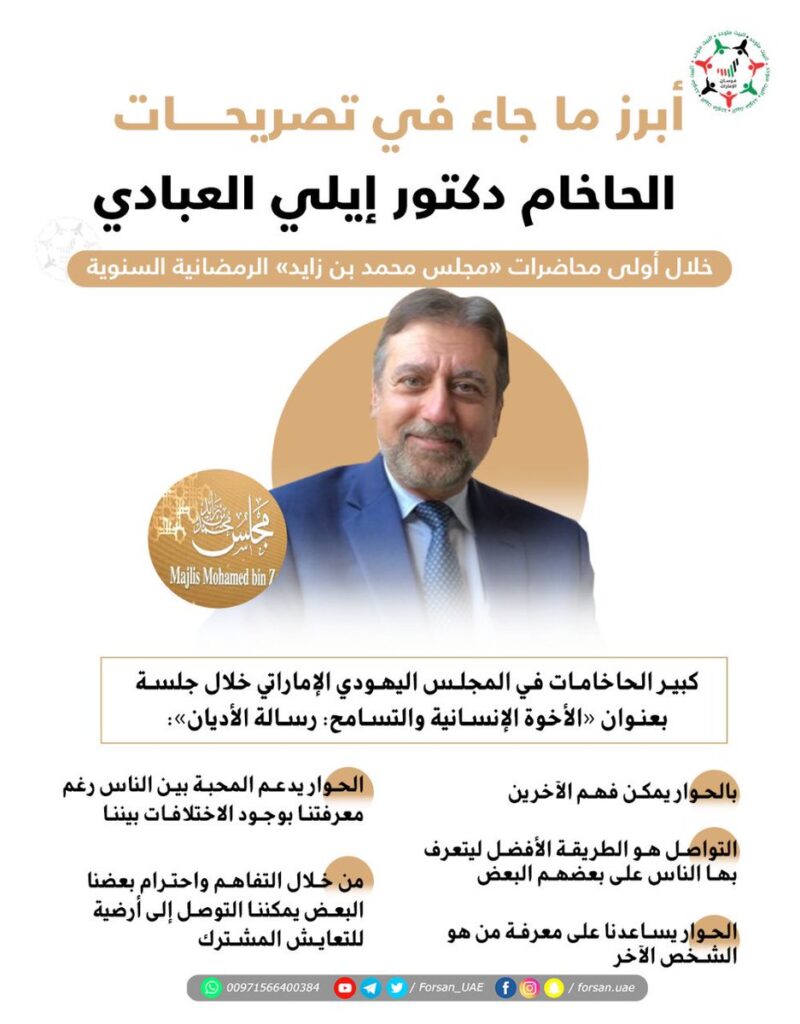
Presently there is no such organization at the international level. While local organizations exist, they have not been able to achieve that mission on a worldwide level. Israeli organizations that pretend to represent Sephardic Rabbinic groups are usually supported and sponsored by a political party and used as an instrument for political advancement of that party.
SIM: What exactly does “Sephardi tradition and legacy” refer to? What lands, and what scholars and scholarly traditions, are part of that tradition and legacy?
R’ Dr. Abadie: By “Sephardi” we refer to the “Greater Sephardic” background, which includes the Jews not only from the Iberian Peninsula, but also the Jews who remained in the Balkan, Middle Eastern, Asian, and North African Diasporas – people previously often referred to as “Mizrahim.” They all share similar traditions, culture, and outlook.
The scholars of this tradition include, but are not limited to, Rif (Isaac al-Fassi, 1013–1103), Maimonides (Moses ben Maimon, 1138–1204), Nahmanides (Moses ben Nachman, 1194–1270), Rashba (Solomon ibn Aderet, 1235–1310), Ran (Nissim ben Reuven, 1320-1376), and many of the Andalusian era. It also includes Rabbis and Sages of modern North African, Middle Eastern, and Middle Asian Jewish Communities.
SIM: Why, in your opinion, is it so important to preserve the global Sephardi legacy?
R’ Dr. Abadie: As the world’s Jews splinter into different factions of religiosity and various political persuasions, the Sephardic Jews have taken a back seat to being heard, understood, and valued.
As keepers of our ancient tradition, and the living legacy of a way of life that is vital to the flourishing of the Jewish people, the time has come for the Sephardim to participate fully and forcefully in issues that concern the welfare and future of all Jews around the world.
As Ashkenazi Jewry has so, unfortunately, fragmented into so many denominations, it has contributed to the disunity of the Jewish People. Many times these denominations do not interact, cooperate or even consider each other as legitimate Jews. Sephardic Jews never experienced the radical reforms of Europe, because different conditions existed in the Muslim world, and therefore Sephardic Judaism remained a relatively harmonious blend of devotions to traditional Judaism and respect for bonds between family and ethno-religious loyalties; consequently, the crisis of Jewish identity caused by modernization, which further alienated the individual Jew from his surrounding culture, did not take place. Today, the very intense arguments that initially caused the process of fragmentation among European Jewry have largely disappeared, such that the Sephardi model retains its relevance.
In short, the Sephardim found a modus vivendi that was characterized by respect for tradition and marked by tolerance for those whose observance of Halakha (Jewish Law) fell short. Whereas some individuals might not be personally observant, the synagogue and communal institutions and structure operated according to tradition and Halakha.
In addition, the classic Sephardic model offers a balance of traditional religious autonomy while at the same time being open to the best teaching of the non-Jewish world.
SIM: While the CSS’ first steps will be internal and rabbinic, you also have a vision for the CSS’ ultimate educational and social relevance. Please share something about that vision.
R’ Dr. Abadie: We aim to write, publish, and distribute books and articles about the Sephardim and Classic Sephardic Judaism.
We want to work together with world Jewish leaders in helping to secure the advancement and growth of the Sephardic Jewish people, and the Jewish people as a whole.
And we hope to unite, promote, preserve, and serve the Sephardic Communities in the world; in fact, in all the countries of their existence.
SIM: You function as Senior Rabbi of the Jewish Council of the UAE, and you have established relationships with many members of Emirati society. How does the UAE view the existence of Jewish communities in Islamic lands?
R’ Dr. Abadie: The UAE views the resurgence and reestablishment of a Jewish community in the region as a positive and welcome event. They are eager to learn more about the Jewish People and Judaism. They are curious to know more about Jewish history and legacy.
SIM: Thank you!
Feature: The Power of Permissibility
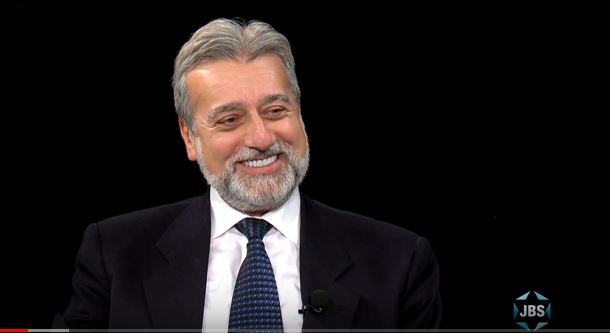
(Photo courtesy of JBS/YouTube)
This month’s feature is a fascinating discussion between the Jewish Broadcasting Service’s Rabbi Mark S. Golub and Rabbi Dr. Elie Abadie on the character and contemporary relevance of Classic Sephardic Judaism. After discussing examples of kashrut and shabbat observance, R’Abadie outlines the approach of “Rabbi Ovadia Yosef and Sephardi poskim throughout the centuries” who hold to the Talmudic principle that “the power of permissibility is preferred to the power of forbidding.” After all, anyone can say, ‘It’s forbidden!’ One need not be particularly smart to apply stringencies and prohibitions. Wisdom is required, however, for declaring something to be permitted within the confines of Halakha.
~~~~~~~
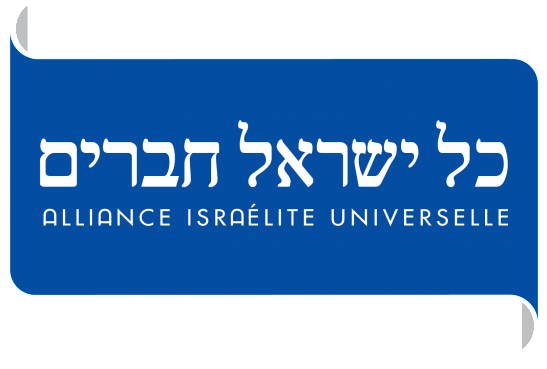
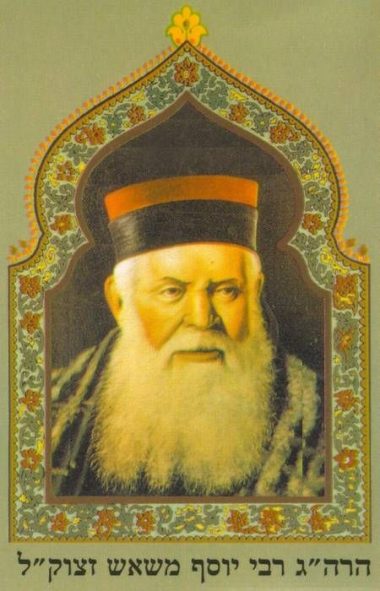
(Photo courtesy of HaSepharadi)
The sage for the month of May is Hakham Yosef Massass (1892-1974). Yosef Massass was born in 1892 in Meknes, Morocco. As a youth, Yosef studied at the Etz Haim Yeshiva in the city of Meknes. After learning for many years, in 1924, at the age of 31, R’ Yosef was appointed to the position of Chief Rabbi of the city of Tlemcen, Algeria. In 1941, he returned to the city of Meknes to serve as dayyan [rabbinic court judge].
But R’ Yosef was a unique kind of sage: a gifted illustrator with a love of poetry, his books are decorated with his drawings, while his language is elegant and numerous poems of his can be found throughout his books.
In 1964 R’ Yosef made Aliyah to Israel, settling in the city of Haifa. In 1968, he was appointed Chief Sephardi Rabbi of the city. Blessed with a personal touch, R’ Yosef frequently visited the sick in hospitals, provided personal support for soldiers wounded in Israel’s wars, was a source of solace and encouragement for bereaved parents, and regularly visited prisoners behind bars.
R’ Yosef authored 48 books, including: three volumes of Otzar Hamichtavim (A Treasury of Letters); Ner Mitzvah (The Light of Commandments) – on the festival of Hannukah and its customs; Nachalat Avot, a six-volume commentary on Pirkei Avot (Ethics of Our Fathers); and Ma’im Ha’im (Living Waters) – two volumes of responsa. Hakham Yosef Massass passed away on 2 Shevat 5734 (1974) and was laid to rest in the Haifa Cemetery.
In the following passage from Otzar HaMichtavim, R’ Yosef demonstrates his broadly humane approach to life, in general, teaching that it is obligatory to attend the funeral of a non-Jew:
His Honor also asked whether it is permissible to attend a Gentile’s funeral. My friend! This matter is an obligation, to maintain amity, even with the lesser ones among them, and certainly if he is among his followers, for they have a share in the World to Come.
~~~~~~~
Upcoming Events or Opportunities:
 New Works Wednesdays: IJE Explores New Research In this session of our New Works Wednesdays series, Claude Stuczynski will discuss Jesuit-converso interactions with Robert Markys and James Bernauer. The special issue of the Journal of Jesuit Studies introduces the phenomenon of Jesuit-converso interactions, mostly in the early modern Iberian world. It summarizes the shifting attitudes of the Society of Jesus vis-à-vis New Christians of Jewish origin as actual or potential Jesuits and maps the multifaceted and variegated interplay between Jesuit priests and converso laymen, understood as a “tragic couple” relationship. This brief survey emphasizes the historiographical contribution of the last generations of Jesuit scholars, and of the five articles included in this special issue of the Journal of Jesuit Studies, to disclose a more overt “historical memory” of the Society of Jesus. About the speakers: Claude B. Stuczynski is an Associate Professor at the Department of General History (Bar-Ilan University), three times fellow at The Herbert D. Katz Center for Advanced Judaic Studies at the University of Pennsylvania, and past board member of the Center for the Study of Conversions and Interreligious Encounters (CSOC) at Ben-Gurion University. Robert A. Maryks, PhD (2006), Fordham University, has published widely on the history of the Jesuits, including The Jesuit Order as a Synagogue of Jews (Brill, 2010). He is the editor of the Journal of Jesuit Studies; Brill’s Jesuit Studies Book Series, Jesuit Historiography Online, and Brill Research Perspectives in Jesuit Studies. James Bernauer, S.J., is Kraft Family Professor of Philosophy Emeritus at Boston College. For twelve years he served as the Director of the Boston College Center of Jewish-Christian Learning. For more about the Journal of Jesuit Studies: https://brill.com/view/journals/jjs/8/2/jjs.8.issue-2.xml Sign-up Now! Sponsorship and Naming opportunities available: info@americansephardi.org |
 To Bigotry No Sanction A magnificent new cantata, composed by Jonathan Comisar, based on George Washington’s historic Letter to the Hebrew Congregation of Newport, Rhode Island Composer Jonathan Comisar’s stunning new cantata, No Bigotry No Sanction, commissioned by Congregation Keneseth Israel in the Philadelphia suburb of Elkins Park, PA, embodies touchstones of Jewish and American music in a choral-orchestral setting. The pre-recorded, streamed performance on June 2nd at 7 PM, conducted by Kensho Watanabe, features members of The Philadelphia Orchestra and a multicultural choir representing 17 languages. The program includes introductory readings by renowned historical interpretive actor Dean Malissa, as “George Washington,” and a post-performance discussion with composer Jonathan Comisar and Congregation Keneseth Israel Rabbi Lance J. Sussman, Ph.D., a professor of American Jewish History. The conversation will be moderated by Emmy Award-winning documentary filmmaker Sam Katz of History Making Productions. Promotional partners for the June 2nd performance of Comisar’s No Bigotry No Sanction are the Center for Jewish History, the American Society for Jewish Music, YIVO, the American Sephardi Federation, the American Jewish Historical Society, the Leo Baeck Institute, and the Lowell Milken Center for the Music of American Jewish Experience, American Conference of Cantors, the Cantors Assembly, the Debbie Friedman School of Sacred Music, Hebrew Union College-Jewish Institute of Religion, the American Jewish Archives, and the American Jewish Committee. This is a free, prerecorded event, no registration required. To learn more and to watch the event click here: https://www.kenesethisrael.org/event/cantata/ Sign-up Now!“I love the way that the music starts out by evoking ancient Jewish sadness only to erupt into the excitement of fife and drums in the new American setting brought about by the Constitution. You save your most momentous music for Washington’s most profound words—to bigotry no sanction, to persecution no assistance—and you invest them with all the weight and majesty they deserve.” – Ron Chernow, Pulitzer Prize-winning author of Washington: A Life Sponsorship and Naming opportunities available: info@americansephardi.org |
 The Jews of the Caucasus: The Multifaceted History of Kavkazi and Georgian Jews Jewish history runs very deep in the Caucasus—an ethnically, linguistically, and religiously diverse region at the crossroads of Europe and Asia. Jewish communities have existed continuously in Georgia, Azerbaijan and the North Caucasus (including Dagestan and Chechnya) for centuries, if not millennia. Join us in exploring the histories and cultures of this region’s oldest Jewish communities. Our first session will focus on Kavkazi Jews (also known as Mountain Jews, Gorsky Jews, or Juhuro), and the second session will highlight the story of Georgian Jews. Thursday, 3 June @ 9AM PDT ◊ 12PM EDT ◊ 5PM London ◊ 7PM Jerusalem ◊ 8PM Dubai Sign-up Now!Co-Presented by COJECO and the ASF Young LeadersAbout the speaker: Born in Uzbekistan and currently based in Seattle, Ruben Shimonov is an educator, community builder, and social entrepreneur with a passion for Jewish diversity. He previously served as Director of Community Engagement and Education at Queens College Hillel. Currently, Ruben is the Founding Executive Director of the Sephardic Mizrahi Q Network, an organization that is building a supportive and much-needed community for LGBTQ+ Sephardic and Mizrahi Jews. He also serves as Vice President of Education & Community Engagement on the young leadership board of the American Sephardi Federation (ASF), Director of Educational Experiences & Programming for the Muslim-Jewish Solidarity Committee, and Director of ASF’s Sephardi House Fellowship—a year-long learning and enrichment program for college student leaders. He is an alumnus of the COJECO Blueprint and Nahum Goldmann Fellowships for his work in Jewish social innovation, and has been listed among The Jewish Week’s “36 Under 36” young Jewish community leaders and changemakers. Ruben has lectured extensively throughout the world on the histories and cultures of various Sephardic and Mizrahi communities. He is also a visual artist specializing in multilingual calligraphy that interweaves Arabic, Hebrew and Persian. He uses his artistry to deepen Muslim-Jewish interfaith learning and community building. Sponsorship and Naming opportunities available: info@americansephardi.org |
 NAHC Invites You To: The Diary of Asser Levy – First Jewish Citizen of New York Meet author Daniela Weil In conversation with historian Noah L. Gelfand, Ph.D. about THE DIARY OF ASSER LEVY First Jewish Citizen of New York Daniela Weil will discuss her recent work of historical fiction, which introduces young readers to the real-life figure of Asser Levy, the first permanent Jewish resident of Manhattan. Levy fled persecution in Recife, Brazil, arriving in New Amsterdam in 1654, where he helped lead the fight for religious and civil rights that first gave shape to the character of modern-day New York. This dramatic story will interest educators and students, and also parents and grandparents. But Isabel’s biggest secret is this: Though the Perezes claim to be New Christians, they still practice Judaism in the refuge of their own home. When the Spanish Inquisition reaches her small town determined to punish such judaizers, Isabel finds herself in more danger than she could ever have imagined. Amid the threat of discovery, she and Diego will have to fight for their lives in a quest to truly be free. A timeless love story about identity, religious intolerance, and female empowerment, The Poetry of Secrets will sweep readers away with its lush lyricism and themes that continue to resonate today. Tuesday, June 8th @6:00-7:30 PM EST Sign-up Now! Co-Sponsored by: The Holland Society of New York, Andrew S. Terhune, The American Sephardi Federation, The Netherland-American Foundation, and The New York Historical Society A Zoom link and password will be emailed to registered participants the day before the program.About the speakers: Daniela Weil was born in Brazil. She graduated from Brandeis University with a degree in Biology. In addition to writing books, Daniela Weil has worked as a scientific illustrator and has written several science and history articles for children’s magazines. In 2014, she began research on a familiar story from her home country: that Jews from Brazil had “founded” the Jewish community in New York in the 1600’s. Five years of research on several continents documented the story of the ship that carried the first group of Jewish refugees from Brazil to Manhattan, where they initiated the legal fight for religious rights. Noah L. Gelfand, Doctoral Lecturer at Hunter College, teaches courses on early United States History and Native American History. He earned his Ph.D. from New York University. Among his awards are a Quinn Foundation fellowship from the McNeil Center for Early American Studies and a Touro National Heritage Trust fellowship from the John Carter Brown Library. He is currently working on a book about the Jewish Atlantic world in the early modern era.Sponsorship and Naming opportunities available: info@americansephardi.org |
 New Works Wednesdays with Sasha Goldstein-Sabbah In this New Works Wednesdays session, Dr. Sasha Goldstein-Sabbah discusses her new book “Baghdadi Jewish Networks in the Age of Nationalism.” The book traces the participation of Baghdadi Jews in Jewish transnational networks from the mid-nineteenth century until the mass exodus of Jews from Iraq between 1948 and 1951. Each chapter explores different components of how Jews in Iraq participated in global Jewish civil society through the modernization of communal leadership, Baghdadi satellite communities, transnational Jewish philanthropy and secular Jewish education. The final chapter presents three case studies that demonstrate the interconnectivity between different iterations of transnational Jewish networks. This work significantly expands our understanding of modern Iraqi Jewish society by going beyond its engagement with Arab/Iraqi nationalism or Zionism/anti-Zionism to explore Baghdadi participation within Jewish transnational networks. About the speaker: Sasha Goldstein-Sabbah received her doctorate from Leiden University, in the Netherlands in 2019, specializing in the modern history of Jewish communities in the Islamic world. During her PhD she worked in Prof. Heleen Murre-van den Berg’s research project “Arabic and its Alternatives: Religious Minorities in the Formative Years of the Modern Middle East (1920-1950).” A revised version of her dissertation entitled “Baghdadi Jewish Networks in the Age of Nationalism” (Brill) was recently published. Following the conferring of her doctorate, she was awarded a Rothschild Hanadiv Europe post-doctoral fellowship for the research project ‘Jewish Transnationalism in the Age of Nationalism: Global Jewish Philanthropy 1918-1948’ also at Leiden University. For more about the book (25% discount code: 72100): https://brill.com/view/title/56163 Sign-up Now! Sponsorship and Naming opportunities available: info@americansephardi.org |
| The Department of Anthropology & Archeology at the University of Calgary, King’s College London, the International Network of Jewish Thought (Universidad Complutense of Madrid), & the American Sephardi Federation present: Sephardi Thought and Modernity 2021 Webinar Series A monthly lecture from February through June 2021, presenting different experiences of Sephardi modernization in different places and times. On Thursdays at 12:00PM EDT (10:00AM MDT) PLEASE NOTE NEW TIME 17 June Yuval Evri (King’s College London) and Angy Cohen (University of Calgary): Foreign in a familiar land: language and belonging in the work of Jacqueline Kahanoff, Albert Memmi, and Jacques Derrida. Sign-up for the Webinar Series Now! (Complimentary RSVP)  The intention of this series is to spark the interest in processes of Jewish modernization not exclusively mediated by Europeanization. The questions we will be dealing with are related to non-dichotomic identities, multiplicity and loss of language, colonization, social transformation, and intellectual responses to it. We will approach these questions by looking at Jewish-Arab influences, the Sephardi response to European modernization, the responses of the rabbinic leadership and the work of Sephardi intellectuals. Series organized by Yuval Evri (King’s College London) and Angy Cohen (University of Calgary).  |
 The ASF Institute of Jewish Experience presents: The Persian Experience Sign-up now! Jews lived in the Middle East, and particularly Iran, even before the advent of Islam. Iran has a long history with varying dynasties, dynastic changes, and evolving borders and Jews have been there continuously throughout these changes. Throughout the ascent of Islam in its different forms, Jews were integrated at times more and at times less economically. There were times of intellectual and spiritual growth as well as suppression and persecution. All this will be addressed and discussed in a historical context. The course is divided into seven units: 1. The Ancient Period – the settlement of the Jews in Iran, Acaemenid, Parthian, and Sassanian times 2. 7th to 9th Centuries – The emergence of Islam, Islam and the Jews, Dhimma, and Jewish religious streams 3. 13th to 18th centuries – Mongols, Jewish Persian poets, Safavid times 4. Mid-18th century to 19th century – Invasion, dynasties, and persecutions 5. The latter part of the 19th century – Interactions with World Jewry, legal status and conversions 6. Early 20th century – Modernization and education, constitution revolution, Zionism 7. The 20th century – Pahlavi dynasty, Revolution, Mashadis, and Migration Dr. Daniel Tsadik Dr. Daniel Tsadik, a former professor of Sephardic and Iranian Studies at the Bernard Revel Graduate School of Jewish Studies, has been awarded The Prime Minister’s Prize (Israel) in 2020 for the Encouragement and Empowerment of Jewish Communities in Arab Countries and Iran for The Jews of Iran and Rabbinic Literature: New Perspectives, published by Mosad Ha-Rav Kook. Tsadik researches the modern history of Iran, Shi’ah Islam, and Iran’s religious minorities. A Fulbright scholar, he earned his Ph.D from the History Department at Yale University. Dr. David Yeroushalmy Born in Tehran, David Yeroushalmy completed his primary and part of his secondary education at the Alliance Israelite school in Tehran. He immigrated to Israel in 1961 and upon completing his secondary education he enrolled in the Department of Middle Eastern History at the Hebrew University of Jerusalem. Completing his B.A. in Middle Eastern Studies and in Political Science, he served in the Israeli Army as an officer. He pursued his doctoral studies at Colombia University New York, in the Department of Middle East Languages and Cultures. He specialized in Persian and Hebrew languages and literatures. D. Yeroushalmy was appointed lecturer in the Department of Middle Eastern and African History at Tel-Aviv University, where he has been teaching Persian language and Iranian history and culture. His Book entitled The Judeo-Persian Poet Emrani and His Book of Treasure, was published by E.J. Brill Publishers, Leiden, in 1995. Dr. Yeroushalmy’s current research focuses on the communal and cultural history of Iranian Jewry in the course of the nineteen-century. Ms. Lerone Edalati Lerone Edalati is a member of the Mashadi community of New York. In addition to her role as Associate Director of Donor Relations at ISEF, she researches and records the history and current practices of the Mashadi Jews. She holds a BA from NYU in Middle Eastern & Islamic Studies, and an MA in Middle Eastern Studies from The Graduate Center, CUNY. She is a Broome & Allen Fellow at the American Sephardi Federation and is currently gathering oral histories of Iranian Jews in NY. Dr. Hilda Nissimi Dr. Hilda Nissimi is the chair of the Generatl History Department at Bar Ilan University. Her most current research focuses on the formation adn change of identity layers in crypto-religious communities, with a particular focus on Mashadi Jews. Her book, The Crypto-Jewish Mashadis, was published in 1985 and remains the main text on the study of that population. She has written numerous articles on identity and forced conversions. This course is made possible with the support of The Shazar Center, Israel. For more information and other ASF IJE online course offerings visit: https://courses.instituteofjewishexperience.org/Sponsorship opportunities available: info@americansephardi.org |
 The ASF Institute of Jewish Experience presents: The Greek Experience Explore the world of Greek Jewry from the ancient Romaniote to the Sephardim and others who made it to and through Greece. An online course presented in 10 minute episodes. Learn at your own pace. Please sign-up now! Total cost of the course is $75.00 Jews have been in Greece since before the Temple was destroyed. They were in Greece upon the founding of the Greek Orthodox Church. Community members, known as Romaniote, made their way through Venice, Byzantium, Spain, across the Ottoman Empire, and beyond. Dr. Yitzchak Kerem provides an overview of the unique languages, liturgical nuances, and communal life of Jews across Greece. Dr Kerem spent significant time living in Greece and researching Greek and Sephardic history. Photographs, maps, and personal accounts provide course participants with a full picture of the unique nature of the Jews of Greece and its surroundings. In the course, participants will look at major influential points in Greek Jewish history. They will explore The Golden Age of Salonika, a time when Greece’s northern city was a hub of Jewish scholarship. Kerem introduces the tension arising in the Greek Jewish community because of Shabtai Tzvi and the Sabbateanism movement that brought with it false messianism and conversion to Islam, at least outwardly. The course looks at when the Alliance Israélite Universelle moved in and the Sephardic culture in Greece developed a rich secular culture with its own novels, theater, and music. This is part of the greater Jewish heritage and history that is often overlooked. ASF IJE online courses will bring to life all parts of the greater Jewish Experience. For more information and other ASF IJE online course offerings visit: https://courses.instituteofjewishexperience.org/ |
 The ASF Institute of Jewish Experience presents: The Crypto Experience The Global History of Secret Jews An online course presented in 10 minute episodes. Learn at your own pace. Please sign-up now! Total cost of the course is $75.00 The ASF Institute of Jewish Experience is proud to present “The Crypto Experience,” an online course on Crypto-Jews. It is part of a series of online courses on a variety of topics that make up the robust Jewish experience. For hundreds of years there have been descendants of Crpto-Jews, who have covertly kept some of their traditions while maintaining a very different public persona. It is a question of identity, be it Huegenot, Catholic, Sephardi, or Mashadi. Professing one faith on the outside and another on the inside speaks to our quest for defining identity today. These questions of identity that we think are so new and so relevant are really rather old questions under different circumstances. In this course Dr. Hilda Nissimi (Bar Ilan University) presents an overview of crypto societies historically and in the context of today. She challenges the participants to ask themselves difficult questions like: What defines identity? If I project this outer self, how do I keep my real me? Who is the real me? Am I the me before the expression of an outer facade? Is it a new me? The course discusses these questions as they pertain to Jews, specifically. What does it mean to be a Jew? What do I have to keep if I want to call myself a Jew? Am I allowed to change? Am I the person to decide? Who will decide? How can anyone decide under such circumstances? In order to understand this in historic and cultural contexts, world-renowned scholars and experts in the field have joined Dr. Nissimi and will be presenting the challenges facing a range of crypto societies: Huegenots – Dr. Hilda Nissimi Spanish-Portuguese Crypto Society – Dr. Ronnie Perelis (Yeshiva University) Bildi’in of Morocco – Professor Paul Fenton (Sorbonne Université, Paris) Mashhadi Jews of Iran – Dr. Hilda Nissimi Tracing Jewish Roots – Genie and Michael Milgrom Growing Up Mashhadi– Reuben Ebrahimoff For more information and other ASF IJE online course offerings visit: https://courses.instituteofjewishexperience.org/ |
 All Jews Together @ the ASF’s Institute of Jewish Experience“We have to unite our energies together. All Jews, together…. If we are united, all Sephardim and also Ashkenazim, together… we will see the light!” ~Enrico Macias The ASF Institute of Jewish Experience is uniquely dedicated to ensuring that today’s Jews know our history; appreciate the beauty, depth, diversity, and vitality of the Jewish experience; and have a sense of pride in Jewish contributions to civilization. Donate Now! |
